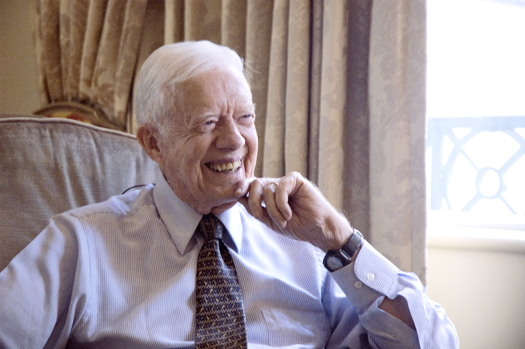|
Reviews of Recent Independent, Foreign, & Documentary Films in Theaters and DVD/Home Video
Directed by Jonathan Demme. Produced by Jonathan Demme & Neda Armian. Director of Photography Declan Quinn. Edited by Kate Amend. Music by: Djamel Ben Yelles, Alejandro Escovedo, Gillian Welch & David Rawlings. Released by Sony Pictures Classics. USA. 125 min. Rated PG. In this ironic and perceptive case study, Jimmy Carter Man From Plains shows just what it takes to raise a major international issue with the American public. But as it goes on, at great length, about Carter’s day-to-day life, it gets tiring following him around from Bible classes to barbecues to board meetings to building houses, no matter how noble the encounters. The Nobel laureate ex-President tries to use the established publicity machine to have his provocatively titled book, Palestine Peace Not Apartheid, bring substantive discussion to the table in 2006. In turn, the chattering classes try mightily to turn his scheduled appearances into a trumped up “developing story.” If you saw or heard his appearances during his seven city promotional tour for his 21st book – including on ABC’s Good Morning America, NPR’s Fresh Air, and PBS’s Charlie Rose, plus the archival press coverage from the Camp David peace conference – then you’ve seen a third of this film. (His publisher, Simon & Schuster, is part of the CBS Corporation, and footage from their sibling Viacom subsidiaries is scrupulously not included, such as his interview with Jon Stewart on Comedy Central’s The Daily Show). In a telling example of the times-they-are-a-changing towards infotainment, Carter passes by the Hollywood sign to yet another make-up preparation room, this time at The Tavis Smiley Show, where the exuberant make-up artist turns out to be a member of the Evers family, yes, the Mississippi Evers, and she hugs him as personal regards from her activist relatives. Compared to what was already publicly available, we don’t see who the radio interviewer is who Carter thinks is obnoxious, and see only one question of the satellite interview with the Arab TV network Al Jazeera. Yet in one of his few filmed piques, he mutters against how his other interviews are edited. While it is clear that virtually none of the interviewers have read his book (he claims the reviewers didn’t either), much of it a rehash of his earlier book The Blood of Abraham: Insights into the Middle East, and he doesn’t get to factual indictments of Israel’s treatment of the Palestinians nor the devastating impact he has witnessed of the segregating security wall until more than halfway through. Only towards the film's end, though neither in the book nor in the updated afterword in the new paperback edition, does Carter explain the United Nations’ definition of apartheid and how the term applies to the Palestinian territories. He obviously relishes the publicity hubbub over a lecture at Brandeis University and a protest by Orthodox rabbis in Phoenix, and rails against the lobbyists of AIPAC (the American Israel Public Affairs Committee), explaining that he’s trying to redress an imbalance in coverage by the U.S. media. The film constantly splices in images of the bloody violence both sides are directing at each other in Israel, the West Bank, and Gaza. Compared to Demme’s tightly-edited documentary The Agronomist, an effective portrait of a Haitian human rights activist who looked to President Carter for inspiration, the editing here by Kate Amend is inadequate. The filmmakers enthuse that they have hours of footage to be included on the DVD, and more could have been saved for that.
So is celebrity the best way to generate discussion of international affairs? The upcoming documentary Darfur Now raises the same issue, sadly
concluding that nowadays it may be the only means. From the opening clip of Carter’s mother, Lillian Carter, appearing on The Tonight Show with
Johnny Carson in 1979, it is seen that President Carter has understood the importance of the media to get across his message. Twenty-seven years
later, Carson’s successor, Jay Leno, fits Carter in before promotional appearances by actor Edward Norton and the band Panic! At The Disco
(performing “Lying Is The Most Fun a Girl Can Have Without Taking Her Clothes Off,” not their most recent hit single,
“The Only Difference Between Martyrdom and Suicide Is Press Coverage”). In the green room, Leno provides shrewd insight into this film, jokingly
asking if Carter is now making his own reality show.
Nora Lee Mandel
|

